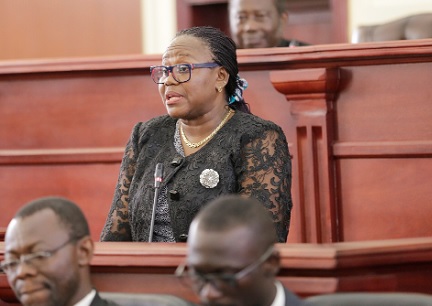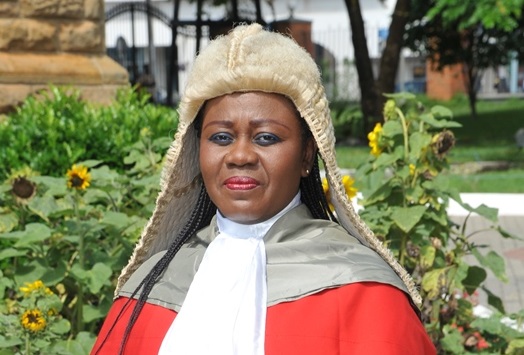SOCRATES said that judges must “listen courteously, answer wisely, consider soberly and decide impartially.”
Ghana expects a lot more of a Chief Justice, as the head of the Judiciary, described by Alexander Hamilton in The Federalist Papers (1778) as the “least dangerous branch” of government because it has “no influence over either the sword or the purse.”
However, our Chief Justice is the fourth person in the constitutional order of precedence, is a member of every superior court, and chairs the Judicial Council and Rules of Court Committee.
The Chief Justice also plays critical roles in the removal from office of the President, superior court judges, Auditor-General, Commissioners and Deputy Commissioners of the Electoral Commission and CHRAJ, and Governor of the Bank of Ghana.
Parliament’s approval process probes Chief Justice-nominees’ judicial philosophy, background and suitability for office, requiring infinitely more effort, detail, time and space than is available or afforded here.
Therefore, this merely attempts to identify the kind of judge that Justice Gertrude Torkornoo has been by examining a few of her Appeal Court decisions in Company Law, a technical subject that several, including the Registrar of Companies, lawyers and judges, have sometimes struggled with.

As a foundation judge on the High Court’s Commercial Bench, Justice Torkornoo’s most significant judicial influence has been in the areas of commercial, business, company and corporate law.
However, from even the deliberately selected and admittedly limited Company Law perspective, she comes across as a no-holds-barred straight shooter, taking no prisoners, observing strict fidelity to both the theory of and exceptions to the law, and conscious that law does not operate in a vacuum, but must be applied to varying factual circumstances.
And more importantly, she is aware and critical of the challenges facing justice administration, and it is hoped that, if approved, her tenure would address those too.

Her Ladyship Justice Gertrude Torkornoo, then Justice of the Court of Appeal, addressing a stakeholder forum by the Ghana-UK Chamber of Commerce on private sector anti-corruption in Accra
‘Lifting the veil’
This doctrine probably has the highest number of Company Law decisions in Ghana.
It describes when the law disregards the classical distinction (an allegedly ‘’opaque and impassable” veil) between companies and their human actors (Salomon Principle), and sometimes holds the latter liable for acts allegedly done on the company’s behalf or in its name.
However, even in England, from where it originated, it has been “characterised by incautious dicta and inadequate reasoning,’’ according to Lord Sumption in PREST v PETRODEL.
Ghanaian decisions were similarly buffeted, until Justice Sophia Akuffo’s magisterial decision in MORKOR v KUMA firmly established three broad bases on which the doctrine applies here: (i) ‘dictates of justice,’ (ii) ‘public policy,’ or (iii) under statute (Morkor v Kuma Standard).
Although the courts have in the main followed this standard, some have either treated it perfunctorily or simply misapplied it.
But in ROBERT ASHIE KOTEI VENTURES LTD v SADAT CAR ACCESSORIES ENTERPRISE, Justice Torkornoo carefully restated the doctrine’s theoretical underpinnings, keeping fidelity with the Morkor v Kuma Standard.
She explained that although the Salomon Principle remains true,”it does not reflect the holistic state of the law.”
Like much of law, it is not set in stone, and because “legal principles are applied to multitudes of factual situations…, law often creates hedges around circumstances that would be considered lawful… and those that must stand outside the hedge.”
She said: “To protect third parties who deal with companies, both statute and common law have made extensive provision to prevent the slavish abuse of this doctrine when the company acts by its organs or human managers.”
The law recognises that those persons “represent the directing mind and will of the company, and they control what it does.
Thus, the state of mind of these managers is the state of mind of the company.”
Their acts bind the company, but if they “take steps for which the corporate veil has to be lifted in order to hold the human agents personally liable for fault, the law would not hesitate to do so.”
Fidelity to the law and its exceptions.

Justice Gertrude Torkornoo, then a nominee to the Supreme Court, taking an oath at the Appointments Committee of Parliament
Foss V Harbottle Rule
This principle has an intriguing jurisprudential existence in Ghana.
It is expressed in (i) the ‘’proper plaintiff rule’’– when a company is wronged, the company itself is the proper person to sue, not its members; and (ii) the ‘’majority rule” – the court will not interfere in a company’s internal matters if the alleged wrong could be regularised by a majority vote.
However, in 1963, the Professor Gower-authored Companies Code introduced exceptions such as rules on illegality and irregularity, protection against oppression and unfair prejudice, and use of derivative and representative actions.
He then boldly declared that the “majority rule’’ was abolished in Ghana.
However, the courts have largely preferred the more nuanced position advanced by Dotse JSC in PS INTERNATIONAL v CEREDEC, that although the Companies Act “has significantly chipped away the relevance of the rule in FOSS v HARBOTTLE in Ghanaian corporate governance,… the courts will still uphold the majority rule, upon a finding that the irregularity or act complained of is one that can be remedied or regularised by an ordinary resolution.’’
Justice Torkornoo has played her part in keeping the rule on the nuanced life-support. In NANA KWADWO GYASI COMPANY LTD v SAND & STONE CONTRACTORS ASSOCIATION, where the Appeal Court dismissed an action by individual shareholders in the company’s name, Her Ladyship applied the ‘’proper plaintiff rule,’’ repeating that individual members have no cause of action if a company is wronged; the action should be brought either by the company itself or by way of a derivative action.
She has also upheld the ‘’majority rule.” In AGME v UPPER QUARRY LTD, where the Appeal Court refused to interfere with the removal of a director from office, Her Ladyship said that once the majority had gone through the process, the court would not pry into it.
‘’This court must necessarily uphold the process,’’ she concluded.

President Akufo-Addo congratulating Justice Gertrude Torkornoo (left) after her swearing in as a Justice of the Supreme Court
Liquidation & ‘Horrors of Delays’
In BERNARD SAM v REGISTRAR OF COMPANIES, Justice Torkornoo showed how sometimes, directors, the Registrar of Companies and even the courts get Company Law wrong.
The company’s directors wrote to the Registrar that they ‘’wish to cancel our [company] due to financial constraint and hope the Registrar of Companies will take action on it.”
Ten days later, the Registrar, ignoring every known statutory procedure, simply declared the company dissolved and struck its name off the register.
When one of the directors subsequently backtracked and applied to the High Court to restore the company, the trial judge dismissed the application on grounds of estoppel by conduct, saying the applicant was ‘’trying to conjure back a company he himself caused the Registrar-General to dissolve...
The application is unmeritorious; the dissolution is confirmed.”
Worse, the judge restrained the applicant “from bringing any further application in respect of this matter.’’
On appeal, the Court unanimously corrected the patent errors. Justice Torkornoo’s lead judgment first summarised the respective statutory procedures for private and official liquidation, and company dissolution with or without winding up, which the Registrar had ignored.
Then, taking no prisoners, she took the Registrar on:
“Strict and mandatory steps are set out, which are designed to protect the public, creditors, people doing business with the company, the company itself and its directors and shareholders from mischief through the liquidation or winding up of the company in issue.
A mere letter expressing a wish to “cancel” a company and a “hope” that the Registrar of Companies does so is definitely not a valid route to dissolving a company.”
Then, ever the straight shooter, she tackled the trial court:
“The matter in issue is very simple.
Was the court right or wrong in refusing the application for restoration of the company to the register?
And the answer is not far-fetched
. The learned trial judge was wrong… and manifestly so.”
She was not done. Pulling no punches, she frontally addressed how the canker of unnecessary delays had plagued the case:
“It is my humble evaluation that this is a case which typifies the horrors of delays in our justice system.
The appeal record is all of 24 pages.
So why has it taken this appeal so long to reach judgment?
The inordinate delay of two years between the High Court judgment and the placing of the case before the Court of Appeal for judgment is indeed worrisome and calls for reforms in the sluggish mode in which appeal records are prepared, rectified, served and made ready for judgment.’’
Concluding comments
Successive Chief Justices have made considerable efforts to modernise the courts and speed up the delivery of justice, with a lot still left to be done.
It is hoped that, if or when confirmed, Justice Torkornoo’s undoubtedly redoubtable judicial fervour and expressed frustrations with the justice delivery system, combined, will lead to the much-needed root-and-stem reforms that scale up the current E-Justice System to completely digitise and digitalise the court experience, deploying technology to further reimagine and transform our civil and criminal justice systems.
Reforms must, for instance, minimise the antiquated and environmentally unfriendly production and filing of the volumes of paper that Charles Dickens contemptuously called “mountains of costly nonsense’’ in 1853.
Reforms must also reduce physical courtroom appearance where 21st Century Africans, bewigged in 17th century-inspired pieces of blond horsehair with curls and pigtails, robed in anachronistic black gowns while sweating in Ghana’s two-tone (hot and hotter) weather, compete to show mastery over arcane technicalities and complex procedures garnished with archaic jargons and redundant legalese, often for just an adjournment.
In sum, may we conclude the journey from “bricks and mortar” to “clicks and order,” and making “court,” not necessarily a place, but a service.
And maybe, just maybe, navigating the realms of Company Law from both the Bar and the Bench has just moulded Justice Torkornoo for this.
by: Ace Anan Ankomah
The writer is the Senior Partner of the law firm of Bentsi-Enchill, Letsa & Ankomah





